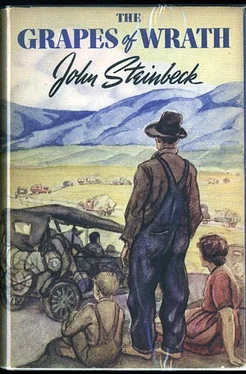John Steinbeck - The Grapes of Wrath
Здесь есть возможность читать онлайн «John Steinbeck - The Grapes of Wrath» весь текст электронной книги совершенно бесплатно (целиком полную версию без сокращений). В некоторых случаях можно слушать аудио, скачать через торрент в формате fb2 и присутствует краткое содержание. Город: New York, Год выпуска: 1939, Издательство: The Viking Press-James Lloyd, Жанр: Классическая проза, на английском языке. Описание произведения, (предисловие) а так же отзывы посетителей доступны на портале библиотеки ЛибКат.
- Название:The Grapes of Wrath
- Автор:
- Издательство:The Viking Press-James Lloyd
- Жанр:
- Год:1939
- Город:New York
- ISBN:нет данных
- Рейтинг книги:5 / 5. Голосов: 1
-
Избранное:Добавить в избранное
- Отзывы:
-
Ваша оценка:
- 100
- 1
- 2
- 3
- 4
- 5
The Grapes of Wrath: краткое содержание, описание и аннотация
Предлагаем к чтению аннотацию, описание, краткое содержание или предисловие (зависит от того, что написал сам автор книги «The Grapes of Wrath»). Если вы не нашли необходимую информацию о книге — напишите в комментариях, мы постараемся отыскать её.
The Grapes of Wrath — читать онлайн бесплатно полную книгу (весь текст) целиком
Ниже представлен текст книги, разбитый по страницам. Система сохранения места последней прочитанной страницы, позволяет с удобством читать онлайн бесплатно книгу «The Grapes of Wrath», без необходимости каждый раз заново искать на чём Вы остановились. Поставьте закладку, и сможете в любой момент перейти на страницу, на которой закончили чтение.
Интервал:
Закладка:
Behind him hobbled Granma, who had survived only because she was as mean as her husband. She had held her own with a shrill ferocious religiosity that was as lecherous and as savage as anything Grampa could offer. Once, after a meeting, while she was still speaking in tongues, she fired both barrels of a shotgun at her husband, ripping one of his buttocks nearly off, and after that he admired her and did not try to torture her as children torture bugs. As she walked she hiked her Mother Hubbard up to her knees, and she bleated her shrill terrible war cry: “Pu-raise Gawd fur vittory.”
Granma and Grampa raced each other to get across the broad yard. They fought over everything, and loved and needed the fighting.
Behind them, moving slowly and evenly, but keeping up, came Pa and Noah—Noah the first-born, tall and strange, walking always with a wondering look on his face, calm and puzzled. He had never been angry in his life. He looked in wonder at angry people, wonder and uneasiness, as normal people look at the insane. Noah moved slowly, spoke seldom, and then so slowly that people who did not know him often thought him stupid. He was not stupid, but he was strange. He had little pride, no sexual urges. He worked and slept in a curious rhythm that nevertheless sufficed him. He was fond of his folks, but never showed it in any way. Although an observer could not have told why, Noah left the impression of being misshapen, his head or his body or his legs or his mind; but no misshapen member could be recalled. Pa thought he knew why Noah was strange, but Pa was ashamed, and never told. For on the night when Noah was born, Pa, frightened at the spreading thighs, alone in the house, and horrified at the screaming wretch his wife had become, went mad with apprehension. Using his hands, his strong fingers for forceps, he had pulled and twisted the baby. The midwife, arriving late, had found the baby’s head pulled out of shape, its neck stretched, its body warped; and she had pushed the head back and molded the body with her hands. But Pa always remembered, and was ashamed. And he was kinder to Noah than to the others. In Noah’s broad face, eyes too far apart, and long fragile jaw, Pa thought he saw the twisted, warped skull of the baby. Noah could do all that was required of him, could read and write, could work and figure, but he didn’t seem to care; there was a listlessness in him toward things people wanted and needed. He lived in a strange silent house and looked out of it through calm eyes. He was a stranger to all the world, but he was not lonely.
The four came across the yard, and Grampa demanded, “Where is he? Goddamn it, where is he?” And his fingers fumbled for his pants button, and forgot and strayed into his pocket. And then he saw Tom standing in the door, Grampa stopped and he stopped the others. His little eyes glittered with malice. “Lookut him,” he said. “A jailbird. Ain’t been no Joads in jail for a hell of a time.” His mind jumped. “Got no right to put ’im in jail. He done just what I’d do. Sons-a-bitches got no right.” His mind jumped again. “An’ ol’ Turnbull, stinkin’ skunk, braggin’ how he’ll shoot ya when ya come out. Says he got Hatfield blood. Well, I sent word to him. I says, ’Don’t mess around with no Joad. Maybe I got McCoy blood for all I know.’ I says, ’You lay your sights anywheres near Tommy an’ I’ll take it an’ I’ll ram it up your ass,’ I says. Scairt ’im, too.”
Granma, not following the conversation, bleated, “Pu-raise Gawd fur vittory.”
Grampa walked up and slapped Tom on the chest, and his eyes grinned with affection and pride. “How are ya, Tommy?”
“O.K.,” said Tom. “How ya keepin’ yaself?”
“Full a piss an’ vinegar,” said Grampa. His mind jumped. “Jus’ like I said, they ain’t a gonna keep no Joad in jail. I says, ’Tommy’ll come a-bustin’ outa that jail like a bull through a corral fence.’ An’ you done it. Get outa my way, I’m hungry.” He crowded past, sat down, loaded his plate with pork and two big biscuits and poured the thick gravy over the whole mess, and before the others could get in, Grampa’s mouth was full.
Tom grinned affectionately at him. “Ain’t he a heller?” he said. And Grampa’s mouth was so full that he couldn’t even splutter, but his mean little eyes smiled, and he nodded his head violently.
Granma said proudly, “A wicketer, cussin’er man never lived. He’s goin’ to hell on a poker, praise Gawd! Wants to drive the truck!” she said spitefully. “Well, he ain’t goin’ ta.”
Grampa choked, and a mouthful of paste sprayed into his lap, and he coughed weakly.
Granma smiled up at Tom. “Messy, ain’t he?” she observed brightly. Noah stood on the step, and he faced Tom, and his wide-set eyes seemed to look around him. His face had little expression. Tom said, “How ya, Noah?”
“Fine,” said Noah. “How a’ you?” That was all, but it was a comfortable thing.
Ma waved the flies away from the bowl of gravy. “We ain’t got room to set down,” she said. “Jus’ get yaself a plate an’ set down wherever ya can. Out in the yard or someplace.”
Suddenly Tom said, “Hey! Where’s the preacher? He was right here. Where’d he go?”
Pa said, “I seen him, but he’s gone.”
And Granma raised a shrill voice, “Preacher? You got a preacher?
Go git him. We’ll have a grace.” She pointed at Grampa. “Too late for him—he’s et. Go git the preacher.”
Tom stepped out on the porch. “Hey, Jim! Jim Casy!” he called. He walked out in the yard. “Oh, Casy!” The preacher emerged from under the tank, sat up, and then stood up and moved toward the house. Tom asked, “What was you doin’, hidin’?”
“Well, no. But a fella shouldn’t butt his head in where a fambly got fambly stuff. I was jus’ settin’ a-thinkin’.”
“Come on in an’ eat,” said Tom. “Granma wants a grace.”
“But I ain’t a preacher no more,” Casy protested.
“Aw, come on. Give her a grace. Don’t do you no harm, an’ she likes ’em.” They walked into the kitchen together.
Ma said quietly, “You’re welcome.”
And Pa said, “You’re welcome. Have some breakfast.”
“Grace fust,” Granma clamored. “Grace fust.”
Grampa focused his eyes fiercely until he recognized Casy. “Oh, that preacher,” he said. “Oh, he’s all right. I always liked him since I seen him—” He winked so lecherously that Granma thought he had spoken and retorted, “Shut up, you sinful ol’ goat.”
Casy ran his fingers through his hair nervously. “I got to tell you, I ain’t a preacher no more. If me jus’ bein’ glad to be here an’ bein’ thankful for people that’s kind and generous, if that’s enough—why, I’ll say that kinda grace. But I ain’t a preacher no more.”
“Say her,” said Granma. “An’ get in a word about us goin’ to California.” The preacher bowed his head, and the others bowed their heads. Ma folded her hands over her stomach and bowed her head. Granma bowed so low that her nose was nearly in her plate of biscuit and gravy. Tom, leaning against the wall, a plate in his hand, bowed stiffly, and Grampa bowed his head sidewise, so that he could keep one mean and merry eye on the preacher. And on the preacher’s face there was a look not of prayer, but of thought; and in his tone not supplication, but conjecture.
“I been thinkin’,” he said. “I been in the hills, thinkin’, almost you might say like Jesus went into the wilderness to think His way out of a mess of troubles.”
“Pu-raise Gawd!” Granma said, and the preacher glanced over at her in surprise.
“Seems like Jesus got all messed up with troubles, and He couldn’t figure nothin’ out, an’ He got to feelin’ what the hell good is it all, an’ what’s the use fightin’ an’ figurin’. Got tired, got good an’ tired, an’ His sperit all wore out. Jus’ about come to the conclusion, the hell with it. An’ so He went off into the wilderness.”
Читать дальшеИнтервал:
Закладка:
Похожие книги на «The Grapes of Wrath»
Представляем Вашему вниманию похожие книги на «The Grapes of Wrath» списком для выбора. Мы отобрали схожую по названию и смыслу литературу в надежде предоставить читателям больше вариантов отыскать новые, интересные, ещё непрочитанные произведения.
Обсуждение, отзывы о книге «The Grapes of Wrath» и просто собственные мнения читателей. Оставьте ваши комментарии, напишите, что Вы думаете о произведении, его смысле или главных героях. Укажите что конкретно понравилось, а что нет, и почему Вы так считаете.











